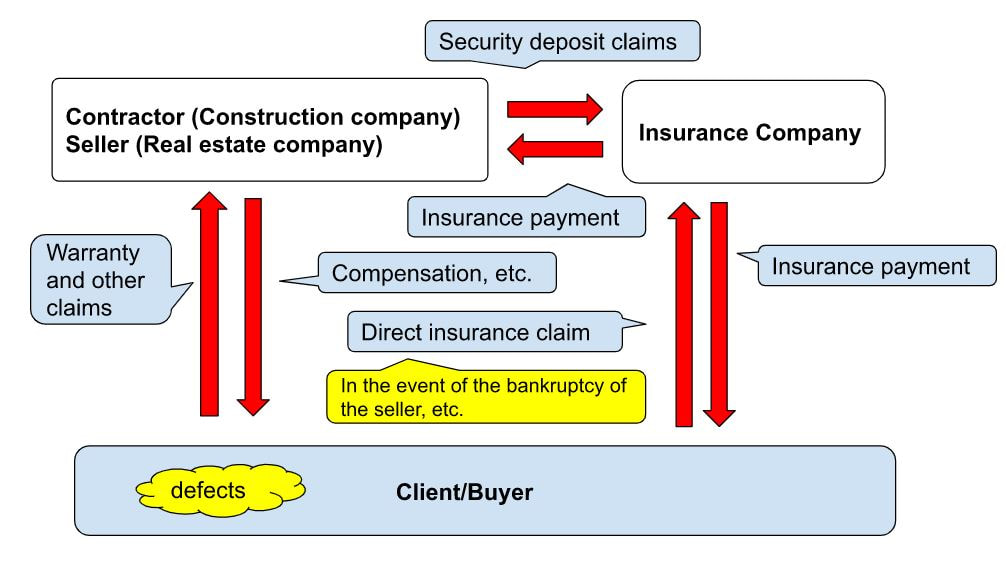Buying a House: Delivery of the Property 3
Dealing with Problems Related to Defects in the Property after Moving in
In order to deal with such problems properly, it is important to have a good understanding of the contents of the sales contract, as well as the related legal system, insurance, after-sales service, warranty system, etc.
When there is a defect in the purchased house, such as a leak or corrosion caused by ants, it was previously called a “defect,” and the seller’s liability for such defects was called “defect liability. However, the amendment to the Civil Code, which came into effect on April 1, 2020, has substantially revised not only the name of this liability but also its content. The revised Civil Code is based on the premise that the seller is obligated to deliver a property that conforms to the terms of the contract with respect to “type, quality, and quantity” of the subject property of the sale, and if the seller delivers a property that does not conform to the terms of the contract with respect to those items, the seller’s liability will be default liability. For example, if the seller delivers a building that leaks or is corroded by white ants, he is in default of his obligation to deliver a property that conforms to the terms of the contract with respect to quality.
When there is such a nonconformity in the subject matter of the contract (the object), the buyer can demand that it be repaired, and when the seller does not do so even after such a demand, or when the repair itself is impossible, the buyer can demand a reduction of the purchase price. In addition, under the general principle of default, a claim for compensation for damages can be made, and the contract can be terminated. However, compensation for damages cannot be claimed if the seller is not responsible in any way. Cancellation is also not allowed when the nonconformity is minor.
Regarding the period during which the seller must assume this responsibility, the Civil Code considers it unreasonable for the seller to assume responsibility for nonconformity for a long period of time and, because it is appropriate to resolve disputes arising from sales as early as possible. The buyer must notify the seller within one year from the time when he/she becomes aware of the nonconformity.
In the case of a newly built house, the following laws protect the buyer. Even if the seller is bankrupt or the seller does not have the resources to pay for damages, the necessary expenses will be paid through insurance or warranty refund.
- The Law for Promotion of Quality Assurance of Housing (hereinafter referred to as the “Housing Quality Assurance Law”)
*The Law, even after the revision of the Civil Code, refers to contractual nonconformity as “defects.”
- The Law Concerning Enforcement of the Liability for Certain Housing Defects (hereinafter referred to as the “Housing Defects Liability Enforcement Law”).
*The Housing Defects Liability Enforcement Law and the Civil Code, since amended, still refer to contractual nonconformity as “defects.”
In the case of a used house, there is no system like that of a newly built house, so the seller’s liability for defect warranty is based on the contract. If the seller is a real estate company that is a registered real estate broker, it is liable for non-conformity to the contract for at least a certain period of time, but if the real estate company goes bankrupt, etc., it is highly likely that the seller will not be able to seek repair or other measures. In addition, if the seller is an individual, there are many contracts that shorten the period of liability for non-conformity to the contract.Therefore, in the case of used properties, it is important to thoroughly check the property before signing a contract to identify any defects in advance. For this reason, recently, due in part to the revision of the Real Estate Brokerage Act, there has been an increase in the number of cases where inspections (building condition surveys) are requested to check the building condition in advance.
In newly built houses*, apart from contractual non-conformity liability, the seller company may provide a voluntary after-sales service to repair certain defects free of charge. Each company has its own standards regarding the types of defects covered by the after-sales service and the duration of the service.
For example, leaks and rainwater leaks involving basic structural components, cracks and damage affecting structural strength, etc., have a 10-year period, the same as under the Housing Quality Assurance Law while damage to walls and malfunctioning equipment often have a 2-5 year period. Recently, some new houses have after-sales service periods of more than 10 years, so it is important to confirm the existence of an after-sales service system and the details of such a system.
*In the case of existing homes, some brokerage firms may offer their own after-sales service, such as repairing certain defects. When selecting a real estate company, be sure to ask about the availability of warranties.
If any of the ancillary equipment in the newly built house has specified maintenance products as stipulated in the Consumer Products Safety Act, the owner’s information should be registered with the manufacturer, etc. immediately after the delivery of the house. In the case of an existing house, if there are specified maintenance products stipulated in the Consumer Products and Product Safety Law in the ancillary equipment you have taken over, provide or change the owner information to the manufacturer, etc. You will receive product safety notices such as inspection notices and recalls.
Liability for non-conformity to the contract is a liability stipulated by law, while after-sales service is just a voluntary service provided by real estate companies and others as part of their consumer services. Although both share the same objective of consumer protection, it is important to note that the subject matter and period of liability are different.
Liability for nonconformity to the contract is limited to “nonconformity of the property to the contract at the time of the transaction.” In general, the period for which the seller is liable is specified in the contract. In addition, the Housing Quality Assurance Law provides for a 10-year warranty period from the date of delivery for newly built houses that have defects in major structural components.
In contrast, the after-sales service covers “certain defects specified in the contract” and is not limited to nonconformity with the contract. In addition, the after-sales service is not limited to major structural components as stipulated in the Housing Quality Assurance Act, but may also cover fittings and equipment, etc. The scope and period of after-sales service are defined by each contract, so it is important to understand the details of the after-sales service.
Under the Housing Defect Liability Insurance system, the seller of a newly built house, such as a real estate company, concludes an insurance contract with a housing defect liability insurance company to cover the cost of repairing defects in the event that they are found in the house. If the seller is bankrupt and cannot repair the defects, the buyer can claim the cost of repairing the defects (insurance money) directly from the housing defect liability insurance corporation.









